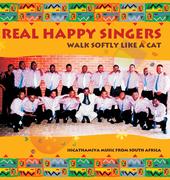The 'REAL HAPPY SINGERS'
History of Isicathamiya
The Real Happy Singers belong to a style of a cappella singing known as isicathamiya (meaning "in a stalking approach", or tiptoe guys). The roots of isicathamiya music are located in African American minstrelsy of the late 1900s, and combines elements of traditional Zulu song and dance with many borrowed and transformed performance practices from the west. Isicathamiya is an all-male genre that is associated with the experiences of migrant laborers at the turn-of-the-century. This labour system attracted thousands of able-bodied men to the cities in search of cash earnings, where they would reside in single-sex hostels for long periods at a time. Here they invented numerous creative performance styles as a way to entertain themselves during their non-working hours, as well as providing an important expressive medium to comment upon their alienated andlonely lives.
Isicathamiya choirs dress in matching suits, two-tone shoes, sashes and gloves. The groups, commonly referred as "teams", are judged according to their neatness, as well as on their choreographic style, the innovative rearrangement of traditional songs and the precision of their presentation. Teams are characteristically divided into 3-voice parts with an emphasis on the bass voices.
Although specifically a Zulu genre, isicathamiya has recently emerged from the hostels and dark inner-city halls to be internationally celebrated by way of the acclaimed group, Ladysmith Black Mambazo. Today, competitions are often held in mainstream theatres, and groups are frequently invited to perform for national and international occasions. Although still representing people who identify with rural traditions and lifestyle, isicathamiya is a slick, dignified and musically rich tradition.
The 'REAL HAPPY SINGERS' was founded on December 7, 1996, and joined the competition circuit in February 1997. To date, the team has won some 58 competitions, has performed for many South African and international dignitaries, and undertaken one tour abroad.
The Real Happy Singers is noted for its size (25 members), its energy and its precision. Dressed in black jackets, white shirts, and black, maroon and white ties, the group stands out amongst others as one of the few to have included a woman singer. The group includes a range of humorous actions that reflect the issues expressed in the music.
The Real Happy Singers has a wide repertory of songs. Typically they sing about moral issues which effect Zulu people in the cities: the dangers of alcohol and its effects on the institutions of marriage and the family, or the hazardous consequences of jealousy and spite. Many of the songs include religious themes, which speak to the Christian orientation of the participants. The repertory of the groups totals some 60-70 songs.
